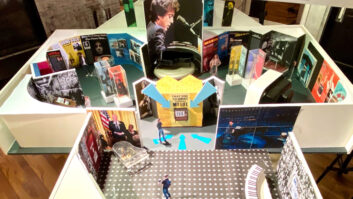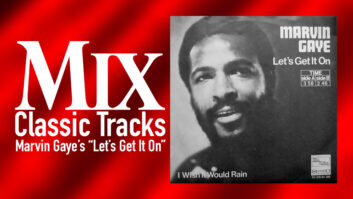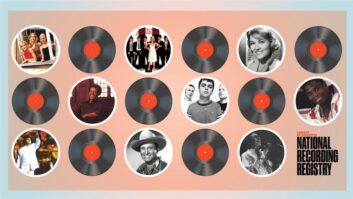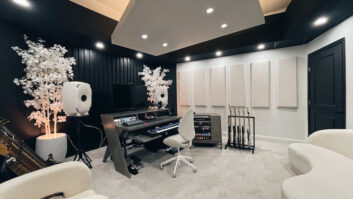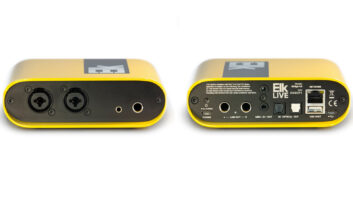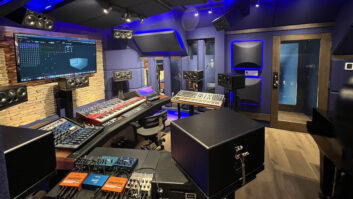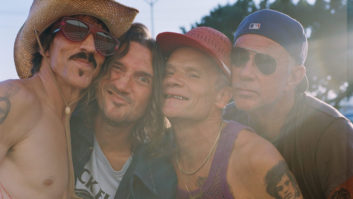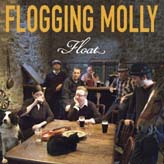
Led by former Dubliner Dave King, Flogging Molly was formed in the late ’90s in L.A. and was a mainstay in clubs and bars there (they took their name from a place called Molly Malone’s) before extensive touring landed them a national (and now international) fan base. These guys (okay, there’s one woman, too) have been selling a lot of CDs the past few years and it’s no mystery why: The band successfully fuses rock ’n’ roll energy and instrumentation with what is essentially an Irish folk approach. Not as punk as The Pogues, as hard as the Dropkick Murphys or as traditional as The Chieftains, Flogging Molly has distinguished itself from the other purveyors of Irish music thanks to King’s bountiful singing and songwriting talents. He’s been writing great songs since FM’s first disc, but on Float (SideOneDummy), he’s turned it up a notch and contributed some of his best material ever: It’s a fantastically varied collection of Irish-tinged rock tunes, ballads and, of course, frenetic dance numbers that sound like they’re somewhere between Paddy Maloney and Shane McGowan. Fiddle, electric guitars, mandolin, tin whistles and drums mix easily and naturally in their eclectic stew.
King writes a lot about overcoming obstacles and perseverance, and I can’t help thinking that some of these songs are about the struggles of keeping a band like Flogging Molly together all these years. Whatever it’s taken, it’s been worth it. The septet has matured into an astonishingly versatile group, capable of both flashy and nuanced playing, but mostly functioning as one terrific band of instrumental equals. And while it is King’s extraordinary vision that drives the band, all are involved in songwriting and arrangements, so clearly there’s a certain unanimity of purpose at work here. While I can’t exactly picture rock radio ever embracing Flogging Molly’s wonderful fusion of styles, it’s easy to imagine a lot of people latching onto this album, so filled with passionate and soulful music which just happens to sound Irish.

Photo: Sarah Simon
Float was produced by the band with Ryan Hewitt (pictured), who also engineered the album at Grouse Lodge in County Westmeath, Ireland, and mixed it at The Pass in L.A. We tracked down Hewitt to ask a few questions about the making of Float.
What’s the story with Grouse Lodge Studios?
It’s a big residential place in the middle of Ireland, probably about an hour and a half from Dublin, out in the country. It’s an estate that was turned into a studio at some point; I think it’s 300 to 400 years old. There are all these old stone buildings and they had enough bedrooms for the band and for me. The place was stunning; absolutely gorgeous.
Is there a big live room?
Yes, a big really big live room. The main live room was built in modern times, and was built from the ground up to be studio. So, that room has one stone wall and the rest is standard plaster or whatever. But one of the smaller rooms is an older room that was all rough-hewn stone; that was amazing. Then there’s a huge, comfortable control room. That has a [Neve] VR, which is not my favorite desk, actually, but it was in good shape and it sounded fine. [The album was mixed on a Neve 8078 at The Pass, Dave Way’s studio, formally was known as Andorra.]
Were you recording to Pro Tools, I presume.
Oh, yes. There was really no other option there.
Flogging Molly is such a good live band, which relies on good communication to achieve its sound. Did you record them live in the studio?
Actually, we cut the rhythm section—electric guitar, bass and drums—live, and overdubbed everybody else. However, when we cut the track, we had the whole band playing together and Dave [King] would do a scratch vocal, but then we didn’t keep the band tracks; we replaced them later.
Did you have them grouped together or isolated?
We pretty much just had the drums in the big room and I had a little doghouse for the bass amp, and the guitar was off in another room, and the others were mostly in the stone room.
Was it a challenge recording electric instruments with the traditional Irish acoustic instruments?
The biggest thing to me about their previous records is that the rhythm section wasn’t loud and powerful enough, in my opinion, so my goal on this record was to make a big rhythm section but still have space for all the traditional instruments. Fortunately, with the traditional instruments, their frequency content and their register is so much higher than the electric guitar and the bass. That said, the electric guitar can take up a lot of room. So we spent a lot of time making sure the instruments weren’t stepping on each other. A lot of it came down to the mix—whatever instrument needed to be heard at a given point had to kind of ride over the rest of it. On their previous records everything tended to be loud all the time and you couldn’t hear the nuances of what was going on as well.
I like how much air there is in the arrangements, and the overall ambience, particularly on the ballads. How much of that is the room, and how much of that is stuff you did later in mixing?
Pretty much everything is room; certainly on the drums everything is room. There are no artificial flavors on the drums at all. The only thing I used in terms of reverb was maybe some plate; there’s a fair amount of plate on [Bridget Regan’s] fiddle. But any sort of processing that’s on the banjo or mandolin is actually out of a guitar amp. We’d used a Fender Twin on him [Robert Schmidt] or an AC-30 to give it more substance. Part of the goal was to make a rockin’ raucous record, and a microphone on a banjo is not going to get that sound across, so we struck him through an amp, and when we wanted some sort of sustaining sound, we’d throw a spring reverb on there or a delay.
This sounds like a band that really works well together.
It is. The band is maturing so much as a group of people. Their collective writing and instrumentation is really amazing, and of course Dave is an incredible songwriter and lyricist.
Of course, it was great working in Ireland. There weren’t too many distractions. If they’d been in L.A., all their friends probably would’ve been coming around, but in Ireland, the farthest they could get away was the pub that we had on campus at the studio. And it did get used a lot! [Laughs]
Blair Jackson is Mix‘s senior editor.
